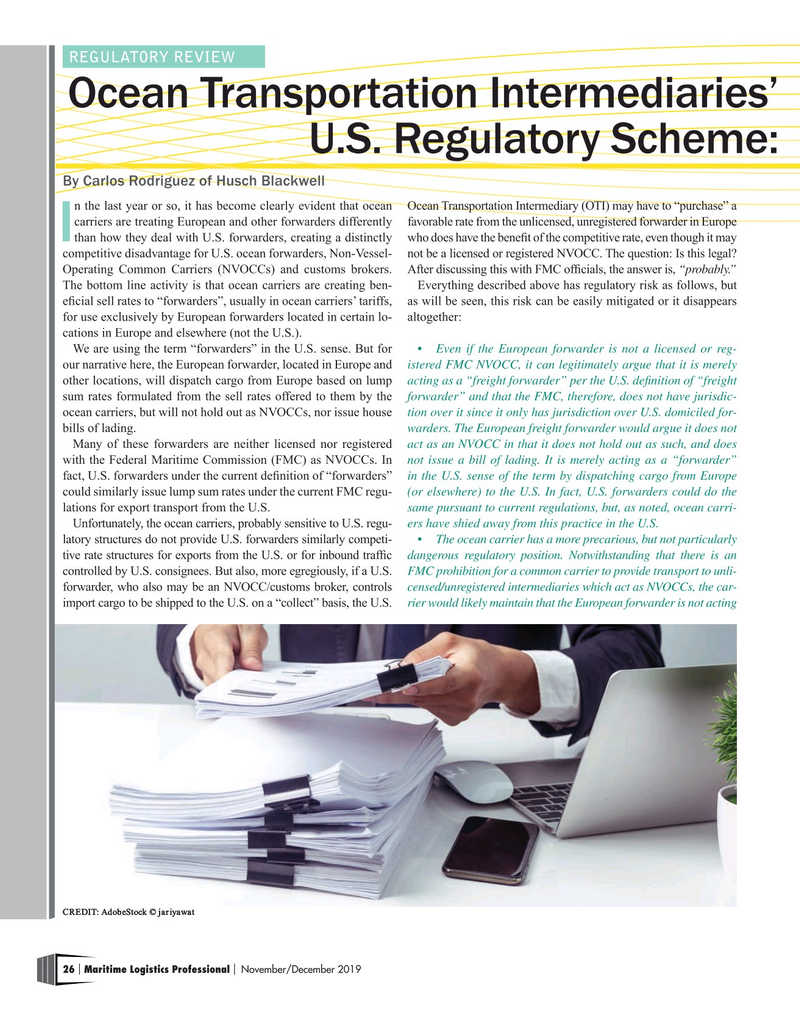
Page 26: of Maritime Logistics Professional Magazine (Nov/Dec 2019)
Short Sea Shipping Ports
Read this page in Pdf, Flash or Html5 edition of Nov/Dec 2019 Maritime Logistics Professional Magazine
REGULATORY REVIEW
Ocean Transportation Intermediaries’
U.S. Regulatory Scheme:
By Carlos Rodriguez of Husch Blackwell n the last year or so, it has become clearly evident that ocean Ocean Transportation Intermediary (OTI) may have to “purchase” a carriers are treating European and other forwarders differently favorable rate from the unlicensed, unregistered forwarder in Europe
Ithan how they deal with U.S. forwarders, creating a distinctly who does have the beneft of the competitive rate, even though it may competitive disadvantage for U.S. ocean forwarders, Non-Vessel- not be a licensed or registered NVOCC. The question: Is this legal?
Operating Common Carriers (NVOCCs) and customs brokers. After discussing this with FMC offcials, the answer is, “probably.”
The bottom line activity is that ocean carriers are creating ben- Everything described above has regulatory risk as follows, but efcial sell rates to “forwarders”, usually in ocean carriers’ tariffs, as will be seen, this risk can be easily mitigated or it disappears for use exclusively by European forwarders located in certain lo- altogether: cations in Europe and elsewhere (not the U.S.).
We are using the term “forwarders” in the U.S. sense. But for • Even if the European forwarder is not a licensed or reg- our narrative here, the European forwarder, located in Europe and istered FMC NVOCC, it can legitimately argue that it is merely other locations, will dispatch cargo from Europe based on lump acting as a “freight forwarder” per the U.S. defnition of “freight sum rates formulated from the sell rates offered to them by the forwarder” and that the FMC, therefore, does not have jurisdic- ocean carriers, but will not hold out as NVOCCs, nor issue house tion o ver it since it only has jurisdiction over U.S. domiciled for- bills of lading. warders. The European freight forwarder would argue it does not
Many of these forwarders are neither licensed nor registered act as an NVOCC in that it does not hold out as such, and does with the Federal Maritime Commission (FMC) as NVOCCs. In not issue a bill of lading. It is merely acting as a “forwarder” fact, U.S. forwarders under the current defnition of “forwarders” in the U .S. sense of the term by dispatching cargo from Europe could similarly issue lump sum rates under the current FMC regu- (or else where) to the U.S. In fact, U.S. forwarders could do the lations for export transport from the U.S. same pur suant to current regulations, but, as noted, ocean carri-
Unfortunately, the ocean carriers, probably sensitive to U.S. regu- ers have shied away from this practice in the U.S.
latory structures do not provide U.S. forwarders similarly competi- • The ocean carrier has a more precarious, but not particularly tive rate structures for exports from the U.S. or for inbound traffc dangerous r egulatory position. Notwithstanding that there is an controlled by U.S. consignees. But also, more egregiously, if a U.S. FMC pr ohibition for a common carrier to provide transport to unli- forwarder, who also may be an NVOCC/customs broker, controls censed/unregistered intermediaries which act as NVOCCs, the car- import cargo to be shipped to the U.S. on a “collect” basis, the U.S. rier would likely maintain that the European forwarder is not acting
CREDIT: AdobeStock © jariyawat 26 Maritime Logistics Professional November/December 2019 | |

 25
25

 27
27
